#salesforce LMS
Explore tagged Tumblr posts
Text
5 Signs You Need a NetForum AMS LMS Integration
Discover 5 signs your association needs a new LMS like MapleLMS & how a seamless NetForum AMS LMS integration can enhance your continuing education program.
0 notes
Text
Future Trends in Learning Management Systems: What to Expect in the Next Decade

The landscape of education and corporate training has been revolutionized by Learning Management System (LMS) software. LMS platforms streamline training, enhance e-learning experiences, and provide actionable insights for organizations worldwide. Choosing the right LMS software can significantly impact the success of your learning initiatives. Here, we highlight the top 10 companies in Learning Management System Software services, showcasing their unique offerings, innovations, and contributions to the sector.
1. Vee Technologies
When it comes to cutting-edge Learning Management System Software, Vee Technologies leads the pack. With a commitment to delivering tailored LMS solutions for businesses and educational institutions, Vee Technologies combines innovation with user-centric design. Their platform supports robust features such as:
Customizable Learning Paths: Designed to meet the specific needs of different industries.
Advanced Analytics: Offering detailed insights into learner progress and performance.
Seamless Integration: Works effortlessly with third-party tools and existing enterprise systems.
Gamification and Interactive Content: Enhancing engagement and retention.
Vee Technologies is recognized for its scalability, making it an excellent choice for small enterprises and large corporations alike. Their dedication to providing top-notch support ensures clients achieve their learning objectives efficiently.
2. Cornerstone OnDemand
Cornerstone OnDemand is a pioneer in the LMS industry, known for its cloud-based learning and talent management solutions. Its platform excels in:
Employee Development: With training programs designed to upskill employees.
AI-Powered Recommendations: Personalized learning experiences for users.
Global Reach: Supporting multiple languages and compliance with international standards.
Cornerstone OnDemand’s versatility makes it a preferred choice for organizations looking to streamline workforce training and talent management.
3. SAP Litmos
SAP Litmos is a robust LMS platform that combines ease of use with powerful functionality. It’s highly regarded for its ability to serve both corporate and extended enterprise training. Key features include:
Content Library: A rich repository of pre-built courses.
Mobile Accessibility: Allowing learners to access content anytime, anywhere.
Quick Deployment: Simplifying the onboarding process.
With SAP Litmos, businesses can ensure their workforce remains competitive in a rapidly changing environment.
4. Blackboard
A household name in the e-learning space, Blackboard caters to academic institutions and corporate training. Its strengths lie in:
Virtual Classroom Tools: Enabling real-time interaction and collaboration.
Comprehensive Reporting: Facilitating data-driven decisions.
Accessibility Features: Making learning inclusive for all users.
Blackboard’s reputation for reliability and innovation makes it a staple in educational technology.
5. Docebo
Docebo’s AI-powered LMS sets it apart from the competition. Its platform focuses on transforming learning experiences through technology. Highlights include:
Social Learning: Encouraging collaboration and knowledge sharing.
Custom Branding: Allowing businesses to align the platform with their identity.
AI-Driven Insights: Providing actionable recommendations for administrators.
Docebo’s emphasis on automation and personalization makes it a top contender in the LMS market.
6. TalentLMS
TalentLMS is designed with simplicity and efficiency in mind, making it ideal for small to medium-sized businesses. Notable features are:
Ease of Use: Intuitive interface for both learners and administrators.
Affordable Pricing: Providing great value without compromising on quality.
Extensive Integrations: Supporting tools like Zoom, Salesforce, and Slack.
TalentLMS ensures that organizations can implement effective training programs without breaking the bank.
7. Moodle
As an open-source LMS platform, Moodle offers unparalleled flexibility and customization options. It’s widely used by educational institutions and organizations seeking a cost-effective solution. Key benefits include:
Community Support: A vast network of developers and users.
Plugin Marketplace: Enabling feature expansion as needed.
Scalability: Suitable for institutions of all sizes.
Moodle’s open-source nature ensures it remains a popular choice for those who value adaptability.
8. Absorb LMS
Absorb LMS focuses on providing a user-friendly and visually appealing learning experience. Its standout features include:
Modern Interface: Enhancing user engagement.
Advanced Analytics: Offering insights to improve training effectiveness.
eCommerce Capabilities: Facilitating the monetization of courses.
Absorb LMS is particularly favored by organizations that prioritize aesthetics and user experience.
9. LearnUpon
LearnUpon is a customer-centric LMS that simplifies the training process for businesses. Its main features are:
Multiple Portals: Allowing companies to manage training for different audiences.
Automation Tools: Streamlining repetitive tasks.
Customer Support: Providing round-the-clock assistance.
LearnUpon’s dedication to delivering value ensures clients can maximize their training outcomes.
10. Edmodo
Targeting the education sector, Edmodo offers a platform that fosters collaboration between teachers, students, and parents. Its core functionalities include:
Classroom Management: Tools to organize and track student progress.
Content Sharing: Facilitating the exchange of resources and ideas.
Engagement Tools: Encouraging participation through polls and discussions.
Edmodo’s focus on enhancing communication and interaction makes it a favorite among educators.
Conclusion Selecting the best Learning Management System Software depends on your organization’s specific needs, whether it’s scalability, customization, or user engagement. By evaluating the features and strengths of these top 10 LMS providers, you can make an informed decision to elevate your learning and training initiatives to the next level.
0 notes
Text
How to Develop a Web App – A Detailed Guide by KSoft Technologies
November 24, 2024
How to Develop a Web App – A Detailed Guide by KSoft Technologies: Discover the essentials of web application development, from planning and design to deployment and maintenance, with expert tips from KSoft Technologies.
Developing a web application is an exciting journey, merging creativity, technical skills, and strategic planning. At KSoft Technologies, we specialize in turning ideas into reality, guiding businesses through this process to create applications that align with their goals and captivate their target audience. In this blog, we’ll walk you through the step-by-step process of web application development, infused with industry best practices and actionable insights.
What Is a Web Application?
A web application is an interactive software platform accessible through web browsers. Unlike static websites, web apps deliver dynamic functionalities like user authentication, data management, and real-time interactions. They empower businesses to enhance engagement, optimize processes, and deliver seamless digital experiences.
Examples of web applications include:
E-commerce Platforms: Amazon, Shopify
Social Media Platforms: Facebook, LinkedIn
CRM Tools: Salesforce
Learning Management Systems (LMS): Moodle, Coursera
Whether you're crafting a simple Minimum Viable Product (MVP)��or a robust enterprise application, a systematic approach is key to success.
The Web Application Development Process 🚀
Creating a web application involves several well-defined stages. Here's how we approach it at KSoft Technologies:
1. Requirement Gathering and Analysis 🧐
Every project starts with a deep dive into your objectives. We collaborate with stakeholders to answer key questions:
Who is your target audience?
What business challenges will the app solve?
What features are essential?
Through brainstorming, interviews, and research, we craft a detailed roadmap for success.
2. Planning and Strategy 📝
With requirements in hand, we create a solid plan, including:
Wireframes: Blueprints of the app’s layout.
Sitemaps: A structured overview of pages and features.
Technology Stack Selection: Choosing frameworks like:
MEAN: MongoDB, Express.js, Angular, Node.js
MERN: MongoDB, Express.js, React, Node.js
LAMP: Linux, Apache, MySQL, PHP
3. Design and User Experience (UX) 🎨
Design plays a pivotal role in app usability. Our approach ensures:
Prototypes: Using tools like Figma to visualize the user journey.
User-Centered Design: Incorporating feedback for intuitive and accessible interfaces.
4. Development 💻
Development is divided into:
Front-End: Transforming designs into responsive, user-friendly interfaces with tools like React, Angular, or Vue.js.
Back-End: Managing data and logic with robust frameworks like Node.js, Django, or Laravel.
At KSoft, we ensure seamless integration between front-end and back-end components for optimal performance.
5. Testing and Quality Assurance ✅
We leave no stone unturned to ensure your app is flawless:
Functional Testing: Validating features.
Performance Testing: Stress-testing under various loads.
Cross-Browser Testing: Ensuring compatibility across major browsers.
Security Testing: Protecting against vulnerabilities.
6. Deployment 🌐
A successful launch involves:
Configuring servers using platforms like AWS or Azure.
Setting up secure databases like MySQL or MongoDB.
Monitoring performance with tools like Datadog.
7. Maintenance and Support 🔧
Post-launch, we keep your app running smoothly with:
Bug fixes and updates.
Security patches.
Scalability optimizations to meet growing demands.
Key Technical Considerations
Choosing the Right Technology Stack: Your stack impacts performance and scalability. Popular options include React.js, Node.js, and PostgreSQL.
Emphasizing Security: Prevent threats like SQL injection and XSS through encryption and audits.
Scalability: Techniques like load balancing ensure your app grows with your business.
Common Challenges and How to Overcome Them
Balancing Features and Performance: Focus on user needs to avoid overloading your app.
Cross-Platform Compatibility: Extensive testing ensures consistent experiences.
Managing Costs: Start small with an MVP and scale strategically.
Why Choose KSoft Technologies for Web Application Development?
Technical Expertise: Mastery of tools like Angular, Django, and PHP.
Comprehensive Services: From wireframes to maintenance.
User-Centric Design: Intuitive, accessible, and engaging applications.
Proven Success: A track record of innovation and excellence.
Looking Ahead: Trends in Web App Development
Stay ahead with emerging trends:
Progressive Web Apps (PWAs): Bridging the gap between web and mobile.
AI Integration: Smarter functionalities with chatbots and recommendations.
Serverless Architecture: Simplified infrastructure with AWS Lambda.
Conclusion 🌟
Developing a web application is a rewarding endeavor. With a structured process and expert guidance from KSoft Technologies, your vision can transform into a high-impact application that drives growth. Ready to start your journey? Let’s build something extraordinary together!
0 notes
Text
Enhancing Virtual Learning Experiences with Salesforce Education Cloud: Trends and Innovations
In the ever-evolving landscape of education, the integration of technology has become more than just a necessity-it's now a fundamental component for delivering effective and engaging learning experiences. As educational institutions navigate the complexities of virtual learning, leveraging cutting-edge solutions has become imperative. Among these, Salesforce Education Cloud emerges as a transformative force, revolutionizing how institutions manage their operations, engage with students, and deliver personalized learning experiences. In this article, we delve into the trends and innovations surrounding the fusion of Salesforce Education Cloud with virtual learning environments.
The Foundation of Effective CRM: Salesforce Education Cloud
At the core of Salesforce Education Cloud lies its robust Customer Relationship Management (CRM) capabilities. Traditionally associated with sales and marketing, CRM software has found a new domain in the education sector, enabling institutions to streamline their interactions with students, faculty, alumni, and other stakeholders. By centralizing data and automating processes, Salesforce Education Cloud empowers institutions to cultivate meaningful relationships throughout the student lifecycle.
Personalization at Scale: Tailoring Learning Experiences
One of the hallmarks of virtual learning is its potential for personalization. Salesforce Education Cloud amplifies this potential by leveraging data insights to tailor learning experiences to individual students. By analyzing student interactions, academic performance, and preferences, institutions can dynamically adjust their curriculum, resources, and support services. This personalized approach not only enhances student engagement but also fosters a deeper understanding of each student's unique learning journey.
Seamless Integration with Learning Management Systems
In the realm of virtual learning, Learning Management Systems (LMS) serve as the backbone for delivering course content, facilitating discussions, and assessing student progress. Salesforce Education Cloud seamlessly integrates with leading LMS platforms, such as Moodle, Canvas, and Blackboard, enabling institutions to unify their data and processes across multiple systems. This integration streamlines administrative tasks, enhances data visibility, and provides a cohesive experience for both educators and learners.
Harnessing the Power of Salesforce Managed Services
While the potential of Salesforce Education Cloud is vast, harnessing its full capabilities requires expertise and ongoing support. This is where Salesforce Managed Services come into play. By partnering with certified Salesforce consultants and administrators, educational institutions can optimize their use of Salesforce Education Cloud, from initial implementation to ongoing customization and support. These managed services ensure that institutions stay ahead of the curve, leveraging the latest features and innovations to drive student success.
Driving Innovation through Salesforce Consulting Services
In addition to managed services, Salesforce Consulting Services offer tailored solutions and strategic guidance to address the unique needs of educational institutions. Whether it's developing custom applications, designing automation workflows, or conducting data analytics, Salesforce consultants provide the expertise needed to maximize the impact of Salesforce Education Cloud. By aligning technology with institutional goals and pedagogical strategies, these consulting services drive innovation and transformation across the education landscape.
Conclusion: Embracing the Future of Virtual Learning
As virtual learning continues to evolve, educational institutions must embrace innovative solutions that empower them to adapt and thrive in the digital age. Salesforce Education Cloud, with its advanced CRM capabilities, personalized learning experiences, and seamless integrations, stands at the forefront of this transformation. By leveraging Salesforce managed services and consulting expertise, institutions can unlock the full potential of Salesforce Education Cloud, revolutionizing how they engage with students, support educators, and deliver impactful learning experiences. As we look to the future, the fusion of technology and education holds immense promise, reshaping the way we teach, learn, and grow.
Customer relationship management software
#salesforce#salesforce consulting services#salesforce managed services#crm#technology#business#consulting#salesforce education cloud
0 notes
Text
AlmaMate Info Tech | Salesforce Training
AlmaMate Info Tech stands as a premier provider of Salesforce Training in Noida and Salesforce Training in Delhi NCR, catering to the burgeoning demand for skilled professionals in the Salesforce ecosystem. Our extensive and meticulously crafted curriculum ensures that learners are equipped with the requisite skills and knowledge to thrive in the dynamic world of Salesforce. Led by seasoned industry experts boasting years of hands-on experience, our training programs offer a seamless learning journey characterized by depth, relevance, and practical insights. We understand the evolving needs of the industry and continuously update our curriculum to stay abreast of the latest trends and technologies in the Salesforce domain. Joining our upcoming batch not only marks the beginning of a transformative learning experience but also sets you on the path to a rewarding career journey. In addition to our comprehensive training modules, we offer a range of supplementary services to bolster your success. From Digital Transformation Services aimed at optimizing business processes to a robust Learning Management System (LMS) and Training App for seamless access to learning resources, we provide the necessary tools and infrastructure to support your learning journey. Moreover, our Customized Training Plans cater to individual learning preferences and objectives, ensuring that each learner receives personalized guidance and support tailored to their unique needs. We understand that securing a job post-training is paramount for our learners' success, which is why our Placement Assurance program offers assistance and support in navigating the job market and securing lucrative career opportunities. At AlmaMate Info Tech, our commitment to quality education and personalized guidance sets us apart. We believe in empowering individuals to unlock their full potential and become proficient Salesforce professionals. Whether you're a seasoned professional looking to upskill or a fresh graduate venturing into the world of Salesforce, we have the resources, expertise, and support system to help you succeed. Contact us today to secure your spot in our upcoming batch and take the first step towards realizing your career aspirations. Join AlmaMate Info Tech and embark on a transformative journey towards becoming a Salesforce pro!
0 notes
Text
Unlocking Success - A Guide To Setting Up The Agency Toolbox

Setting up an effective agency toolbox is a critical step in ensuring the smooth and efficient operation of any organization. From digital tools to strategic frameworks, creating a comprehensive toolbox equips your agency with the resources needed to thrive in today's dynamic business environment. Define Your Agency's Objectives Before assembling your toolbox, clearly define your agency's short-term and long-term objectives. Understanding your goals will guide you in selecting tools that align with your mission and contribute to your overall success. Digital Tools for Efficiency a. Project Management Platforms: Utilize platforms like Trello, Asana, or Monday.com to streamline project management, enhance collaboration, and keep teams organized. b. Communication Tools: Local Marketing Vault Implement communication tools such as Slack or Microsoft Teams to facilitate real-time communication, fostering collaboration among team members. c. Cloud-Based Storage: Invest in cloud-based storage solutions like Google Drive or Dropbox for secure, accessible, and collaborative file management. Marketing and Outreach a. Social Media Management: Platforms like Hootsuite or Buffer help schedule posts, track engagement, and manage social media campaigns effectively. b. Customer Relationship Management (CRM): Implement a CRM system like HubSpot or Salesforce to centralize customer data, streamline communication, and enhance client relationships. c. Email Marketing Tools: Utilize tools like Mailchimp or Constant Contact for targeted email campaigns, newsletters, and customer engagement. Analytical and Reporting Tools a. Analytics Platforms: Google Analytics and similar tools provide insights into website traffic, user behavior, and marketing performance. b. Data Visualization Tools: Tools like Tableau or Power BI help transform raw data into visual representations for clearer insights and decision-making. Cybersecurity Measures a. VPNs and Security Software: Prioritize cybersecurity with tools like VPNs, antivirus software, and firewalls to safeguard sensitive information. b. Password Management: Implement password management tools such as LastPass or 1Password for secure and organized access to passwords. Training and Development Resources a. Learning Management Systems (LMS): Use LMS tools like Moodle or TalentLMS for employee training, onboarding, and continuous development. b. Knowledge Sharing Platforms: Platforms like Confluence or Microsoft SharePoint enable seamless knowledge sharing and collaboration among team members. Legal and Compliance Tools a. Document Management: Tools like DocuWare or Adobe Sign assist in efficient document management, e-signatures, and compliance. b. Compliance Tracking Systems: Invest in tools that track regulatory compliance, ensuring your agency adheres to industry standards and legal requirements. Collaboration and Ideation Platforms a. Virtual Whiteboards: Tools like Miro or MURAL offer virtual whiteboards for collaborative brainstorming, idea generation, and project planning. b. Video Conferencing: Platforms such as Zoom or Microsoft Teams facilitate seamless virtual collaboration, meetings, and client interactions. Client Relationship Management (CRM) a. CRM Systems: Implement a CRM system like HubSpot or Salesforce to centralize client information, track interactions, and enhance customer relationships. b. Customer Feedback Tools: Utilize tools like SurveyMonkey or Typeform to collect valuable feedback from clients, helping enhance services and customer satisfaction. Continuous Evaluation and Optimization Regularly assess the effectiveness of your agency toolbox. Stay informed about emerging tools and technologies to ensure your toolbox evolves with the ever-changing business landscape. By thoughtfully selecting and integrating tools into your agency toolbox, you create a powerful resource that not only enhances operational efficiency but also positions your agency for sustained success in a competitive market.
1 note
·
View note
Text
Salesforce in Education: Simplifying Enrollment and Admissions Processes
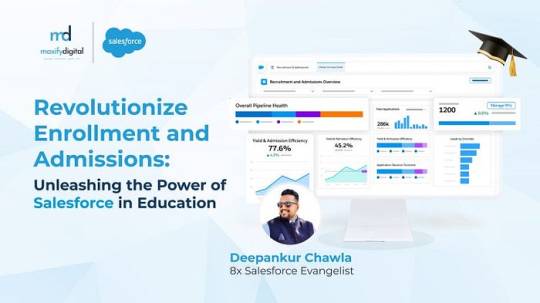
Streamlining Enrollment and Admissions Processes using Salesforce in Education
In the rapidly evolving landscape of education, institutions face numerous challenges when it comes to managing enrollment and admissions processes efficiently. The traditional manual methods often lead to bottlenecks, errors, and unnecessary delays, impacting both students and administrative staff. However, with the implementation of Salesforce, a powerful customer relationship management (CRM) platform, educational institutions can streamline their enrollment and admissions processes, improving efficiency, accuracy, and the overall student experience.
Educational institutions must adapt to the digital era to attract and retain students effectively. Salesforce address the need for the following:
Centralized Student Data Management: Salesforce can serve as a centralized database for storing and managing student information. It allows you to create custom objects and fields to capture relevant data such as contact details, academic records, application status, and more. This centralization enables easy access to information and eliminates the need for manual data entry and multiple systems.
Online Application and Forms: Salesforce’s web-to-lead and web-to-case features enable the creation of online application forms that prospective students can fill out and submit directly through your institution’s website. This streamlines the application process and eliminates the need for paper-based forms. The data submitted through these forms is automatically captured in Salesforce, enabling efficient tracking and follow-up.
Automated Workflows and Approvals: Salesforce Workflow Rules and Approval Processes can automate various steps in the enrollment and admissions process. For example, you can create workflows to send automated notifications to applicants, schedule follow-up actions, assign tasks to staff members, and trigger alerts for missing information. Approval processes can be used to route applications to the appropriate personnel for review and decision-making.
Communication and Engagement: Salesforce’s communication tools, such as email templates, mass email campaigns, and SMS messaging, can be utilized to keep applicants informed about the status of their applications, share important updates, and engage with prospective students. These tools enable personalized and timely communication at scale, enhancing the overall applicant experience.
Reporting and Analytics: Salesforce’s reporting and analytics capabilities provide valuable insights into the enrollment and admissions processes. You can generate reports and dashboards to track key metrics, monitor application trends, measure conversion rates, and identify bottlenecks. These insights can inform decision-making, identify areas for improvement, and optimize resource allocation.
Integration with Other Systems: Salesforce can be integrated with various third-party systems and tools, such as student information systems (SIS), learning management systems (LMS), and financial aid systems. Integration allows for seamless data flow between systems, reducing duplicate data entry and ensuring data consistency across platforms.
Mobile Access: Salesforce offers mobile apps for iOS and Android devices, allowing admissions staff to access and update student data on the go. This mobility facilitates efficient and timely responses to applicant inquiries, enables real-time collaboration, and enhances productivity.
Salesforce Education Cloud is a powerful CRM platform that revolutionizes the management of student journeys in educational institutions. Here are four key points about the platform:
360-Degree Student View: Salesforce Education Cloud provides a comprehensive view of each student’s journey, starting from prospective inquiry to enrollment and beyond. It enables personalized communication, automates tasks, and empowers institutions to make data-driven decisions, ensuring a tailored and efficient experience for students.
Community Engagement: Educational institutions can leverage the Community Cloud to create online communities for prospective students, current students, parents, and alumni. These communities serve as collaborative platforms where information can be shared, queries can be answered, and support can be provided throughout the admissions process.
Support for the Entire Education Journey: Salesforce in education offers comprehensive support for the entire education journey, spanning from K-12 to higher education. The platform provides a unified solution that can be customized to meet the specific needs of each institution.
Digitized Campus Experience: Salesforce enables educational institutions to create a digital campus that enhances collaboration, engagement, and productivity. Through digitization, processes such as registration, course management, scheduling, grading, and student support services can be streamlined and accessed through a centralized platform. This digital transformation improves operational efficiency and enhances the student experience by providing convenient access to information, personalized support, and a connected learning environment.
Arizona State University (ASU) implemented Salesforce Education Cloud, centralizing student data and streamlining admissions. Personalized communication led to a 50% increase in applications and a 30% increase in enrollment. ASU utilized Salesforce’s analytics for student progress tracking, improving retention and graduation rates. Similarly, University of Massachusetts (UMass) Lowell leveraged Salesforce’s marketing automation, resulting in a 40% increase in applications and a 30% increase in yield rates. Salesforce’s reporting and analytics enabled data-driven decisions, optimizing recruitment strategies for UMass Lowell.
To experience the transformative power of Salesforce in education, partner with Maxify Digital. We specialize in implementing Salesforce solutions for educational institutions. Embrace digital innovation and AI to unlock the full potential of your institution. Connect with us to schedule a consultation and discover how Salesforce can revolutionize your educational institution.
0 notes
Text
Join Our Webinar: Streamline Compliance with Training Automation!
Did you know that 94% of businesses still rely on time-consuming, repetitive processes? Automation is transforming the workplace, with 90% of knowledge workers in better roles and 66% reporting increased productivity.
Join us for our upcoming webinar, “Compliance Made Easy: Automate Training Workflows with Salesforce LMS” on 24th October 2024 at 2 PM EDT to see how to streamline compliance using automated training workflows.
Read more:
Matt Peterson, Relationship Director at MapleLMS, will explore Salesforce LMS's compliance automation features, while Avin Tiwari, Customer Training Manager, will showcase our real-time LMS modules that simplify training. Discover the following Key Takeaways from the webinar:
Simplified Compliance Management
Centralized Reporting and Analytics
Seamless Integration with Existing Salesforce Tools
Automated Reminders and Notifications
Customizable Compliance Pathways
Scalability and Flexibility
Don’t miss out on the great insights of compliance management in this webinar!
#salesforce lms#learning management system#online learning#elearning#learning management systems#lms#maplelms#lms software#learning management system trends
0 notes
Text
What software is used to manage coaching classes?
There are several software options that can be used to manage coaching classes. The choice of software depends on the specific needs of your coaching class, but here are some common types of software and their purposes:

Learning Management System (LMS): LMS software is designed to manage and deliver educational content. It can be used to create and organize course materials, track student progress, and facilitate communication between instructors and students. Popular LMS options include Moodle, Canvas, and Blackboard.
Student Information System (SIS): SIS software is used to manage student data, including enrollment, attendance, grades, and personal information. It helps streamline administrative tasks for coaching classes. Common SIS solutions include PowerSchool, Infinite Campus, and Ellucian.
Communication and Collaboration Tools: Effective communication is essential for coaching classes. Tools like Google Workspace (formerly G Suite), Microsoft Teams, or Slack can help instructors and students communicate, collaborate on assignments, and share resources.
Online Scheduling and Booking Software: To manage class schedules and appointments, you can use scheduling software like Calendly or Acuity Scheduling. These tools make it easy for students to book coaching sessions with instructors.
Payment and Billing Software: For managing tuition fees and payments, consider using payment processing software like PayPal, Stripe, or specialized education billing platforms.
Virtual Classroom Software: If your coaching classes are conducted online, virtual classroom software such as Zoom, Microsoft Teams, or Adobe Connect can facilitate live video sessions, screen sharing, and interactive features like chat and polling.
Content Creation Tools: To develop course content, you may need software for creating presentations, documents, and multimedia materials. Microsoft Office, Google Docs, and Adobe Creative Cloud are popular options.
Attendance Tracking Apps: Apps like AttendanceBot or RollCall can help you track and manage student attendance, whether in-person or online.
CRM Software: Customer Relationship Management (CRM) software can be useful for managing student inquiries, enrollment, and maintaining contact records. Popular CRM options include Salesforce and HubSpot.
Survey and Feedback Tools: To collect feedback from students and improve your coaching services, consider using survey tools like SurveyMonkey or Google Forms.
Analytics and Reporting Tools: Tools like Google Analytics or specialized educational analytics platforms can help you analyze student performance and make data-driven decisions.
Project Management Software: For organizing and tracking tasks related to course development and administration, project management tools like Asana, Trello, or Microsoft Project can be beneficial.
It's important to assess your coaching class's specific needs and budget before choosing the right software solutions. Some platforms may offer integrated features, while others may require integration with other tools to meet all your requirements. Additionally, consider factors like scalability, user-friendliness, and customer support when making your selection.
free demo for coaching management software
#coaching management software#coaching software#software#institute management software#institute software#erpsoftware#schoolmanagementsoftware
0 notes
Text
3 technology trends that will drive the Global E-learning markets to reach $ 400 Bn by 2027 says a report by Ken Research
Buy Now
Global E-learning Market Ecosystem
Global E-learning Market is at a growing stage. It is a fragmented market with the presence of many e-learning companies. The e-learning market has seen emergence of abundant players in the past 5 years and the industry will further boost owing to the needs and wants of consumers for a more personalized learning platform. Few major global e-learning players are Aptara, Inc, Adobe Systems Inc, Cornerstone, Citrix Education, Meridian Knowledge Solutions, Microsoft Corporation etc.

E-learning Global Service Provider Market
1.Mobile Learning Technologies are Growing at a Fast Pace
The mobile learning technology has witnessed faster adoption in the eLearning market with the increased use of smartphones. Many application-based knowledge platforms are being developed which allow smartphone users to gain insights into any topic in real-time. Some educational institutes and universities develop their own mobile-based applications that allow the students to log in to the student portal and get access to the missed lectures. A few prominent mobile applications currently in use in the corporate sectors are Udemy, Skill Pill, Design Jot, and Boost HQ. Furthermore, the developers in the market also offer a game-based application platform that is used for teaching children with the help of interactive animated videos and pictures. These technologies enable schools to enhance the logical & reasoning skills and IQ of their students.
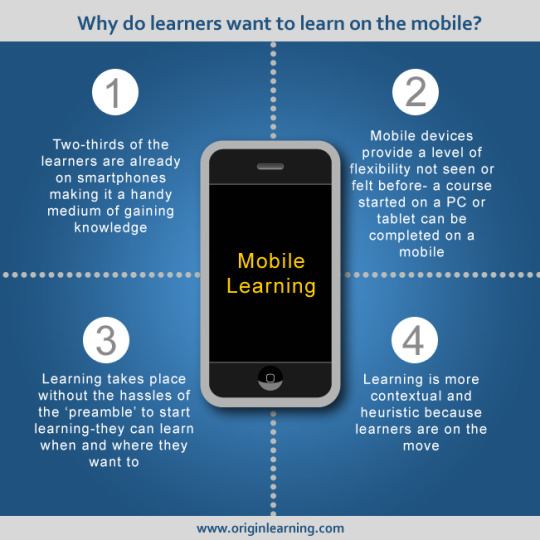
Interested to Know More about this Report, Request for a sample report
2.Increasing Use of VR and AR Applications to Create Lucrative Opportunities for the Global E-learning Market
Virtual reality technology facilitates deep learning by decreasing danger and immersing learners in a new setting. Because they provide practical answers, AR and VR technologies are increasingly being employed in the classroom. Virtual reality is being used to carry out complex procedures and handle high-risk situations. They cater to individual needs and assist students in developing a fully immersive learning experience. Immersive VR Education is a software company founded in 2014. They are best known for their ENGAGE platform that was specifically built for training and education based on virtual reality. Alchemy VR is another such platform which is one of the leaders in modern technological innovations in the realm of education.
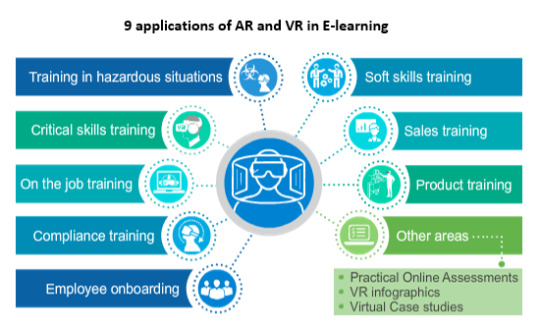
3.Insight by Deployment Model in the e-learning space: Based on the deployment model, the cloud segment is leading the industry globally and is expected to register the fastest CAGR over the foreseen period. Cloud-based solutions are gaining remarkable traction in schools and universities due to their cost-effective and flexible training approaches for students. The cloud computing-based e-learning technology further enables educational institutions to build a virtual environment for learners and educators. Thus, cloud technology is majorly implemented in the education sector, which is expected to contribute towards high segmental growth.��The public cloud deployment model works well with companies with little privacy concerns. Amazon Elastic Compute Cloud (Amazon EC2), AWS (Amazon Web Services), Microsoft Azure, IBM Cloud, Google Cloud, Salesforce Heroku are a few examples of public cloud deployments.
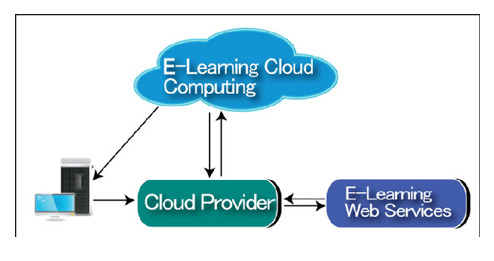
Visit this Link :- Request for custom report
Market Taxonomy
By Provider
Content Provider
Service Provider
By Deployment Model
On-premise
Cloud
By Course
Primary and Secondary Education
Higher Education
Online Certification and Professional Course
Test Preparation
By End User
Academic
Corporate
Government
By Region
North America
Europe
Asia-Pacific
LAMEA
Key Target Audience
E-Learning Companies
LMS Platforms
Language Learning Platforms
Institutes/Colleges
Schools
Investors
Industry Associations
Consulting Agencies
Government Bodies & Regulating Authorities
Time Period Captured in the Report
Historical Year: 2017-2022
Base Year: 2022
Forecast Period: 2022– 2027
Major Players Mentioned in the Report
Adobe
Aptara Inc.
Articulate Global, LLC
CERTPOINT
Cisco Systems, Inc.
Citrix Systems, Inc.
D2L Corporation
Microsoft Corporation
Oracle Corporation
SAP SE
For More Insights On Market Intelligence, Refer to the Link Below: –
Global E-learning Market
Related Reports by Ken Research: –
Egypt E-Learning Market Outlook to 2026- Driven by easy and on-demand access to content, self-paced learning opportunities and interactive & modular means of learning
Turkey E-Learning Technology and Content Market Outlook to 2023 - Growing Demand for M-Learning and Higher Use of Videos and Animation to Foster Market Growth
UAE Experiential Learning Market Outlook to 2025- Concentrated Activity Box and E-Learning Segment Paving Ways for International Players to Expand
#Global Online Learning Industry#Challenges#Opportunities remote learning Global#Leading Players#Competitors.
0 notes
Text
surveying courses online
Get Turnkey integrations with the popular LMSs at Eval System. we provide Intuitive Setup and Deployment with evaluation surveys & surveying courses online.
Why Choose Us

We have 12+ years of experience in course evaluation and surveys in higher education and K12 as well as corporate training.
Intuitive Setup and Deployment
Variety of question types and easy survey setup and deployment in minutes. Create questionnaires for different levels of your institution Reuse questions in multiple surveys with the ability to schedule and deploy a survey in the future.
Turnkey LMS Integrations
Offers deep integrations with most of the popular LMS in the market, such as Canvas, Moodle, and Blackboard. From importing and syncing courses and user data to survey notifications in the LMS to drive response rate.
Robust Reporting
Real-Time response rate tracker with robust reporting at the course and institutional level with the ability to view longitudinal reports using AI/ML Technology
Save Time and Resources
With automated process and easy to setup and deployment, you will save time and money, and free up human resources to focus on other non-automated jobs.
Turnkey LMS Integrations
Turnkey integrations with the most popular LMSs, such as Canvas, Blackboard (including Ultra), and Moodle. Just import the initial data and EvalSystem will take care of the rest. It will synchronize courses and enrollments with no user interaction.
Turnkey Learning Management System (LMS) integrations refer to pre-built or ready-to-use integrations between an LMS platform and other software systems or tools. These integrations streamline the process of connecting and sharing data between different systems, enhancing the functionality and efficiency of the LMS.

Some common turnkey LMS integrations include:
Content Authoring Tools: Integrating an LMS with content authoring tools allows instructors to create and upload e-learning content directly into the LMS. Examples of content authoring tools include Articulate Storyline, Adobe Captivate, and Camtasia.
Video Conferencing Tools: Integrating an LMS with video conferencing tools enables instructors to schedule and conduct live virtual classes or webinars within the LMS platform. Popular video conferencing tools include Zoom, Microsoft Teams, and Google Meet.
HR and Payroll Systems: Integrating an LMS with human resources (HR) or payroll systems allows for automated user management, user authentication, and employee data synchronization. This integration ensures that user accounts and employee records remain up to date in the LMS. Examples of HR and payroll systems include SAP SuccessFactors, Workday, and ADP.
Customer Relationship Management (CRM) Systems: Integrating an LMS with CRM systems enables organizations to track and manage training and learning activities for customers or external stakeholders. This integration helps provide a personalized and seamless learning experience. Popular CRM systems include Salesforce, Microsoft Dynamics 365, and HubSpot CRM.
Single Sign-On (SSO) Solutions: Integrating an LMS with an SSO solution allows users to access the LMS using their existing credentials from a centralized identity provider. This eliminates the need for separate login credentials and enhances security and user convenience. Examples of SSO solutions include Okta, Azure Active Directory, and OneLogin.
It's important to note that turnkey LMS integrations may vary depending on the specific LMS platform and the available integrations provided by the LMS vendor. When considering an LMS, it's advisable to check the vendor's documentation or consult with their support team to understand the integrations they offer and the process for implementing them.
Visit for click: https://www.evalsystem.com/
0 notes
Photo
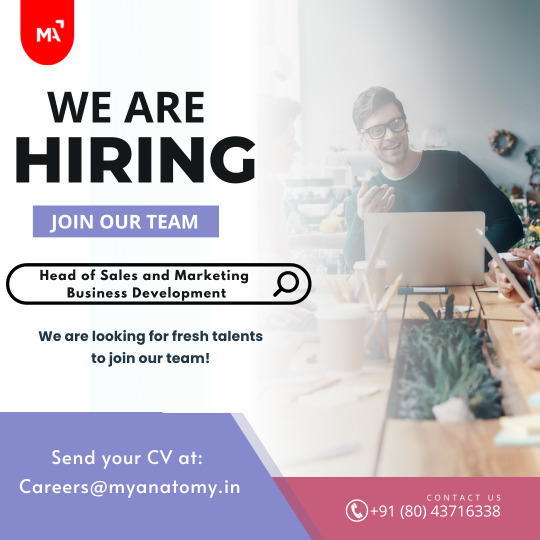
✔Hiring Alert! Company Name: MyAnatomy Integration PVT. Int. ltd. MyAnatomy is India’s one of the promising Digital Talent platforms. Our products and services help corporate to acquire talent with minimum effort, time, and resource investment. We work with many fortune 500 companies and MNCs, MSMEs, and large enterprises to meet there day to day talent needs. Our SAAS-based Products, such as MAPIT (assessment, Movie, and LMS) and MATCH (interview management and campus connect), were highly admired. In brief, we strive to create a Talent Ecosystem through comprehensive platform-based services and are engaged in creating a Digital Talent Platform that emerges in the Skill assessment and recruitment arena. Registration Link - https://docs.google.com/forms/u/1/d/e/1FAIpQLSf-4QZjF9EECBQGtsULumX6CYvn7CQvuxbk2Q8ERKu2omi0gw/viewform Job role: Head of Sales and Marketing – Business Development Type: Full-time Location: Work from Home/Bangalore, Whitefield. Experience: 7+ years of experience in sales and marketing Salary: 20% hike from the current CTC & additional attractive Incentive. Job Overview: The Sales and Marketing Manager is responsible for leading the company's sales and marketing efforts and driving revenue growth. This role requires a strategic thinker with a proven track record of successful sales and marketing management and a deep understanding of the industry and marketplace. Roles & Responsibilities. - Onboard the sales process with the right tools and provide hands-on training to the team. - Strategy on an email campaign, cold calling, and LinkedIn contacts to generate the lead. - Lead a team of sales professionals, including setting performance goals, providing coaching and mentorship, and managing performance. - Set sales targets amongst the team members to ensure that the monthly targets are achieved. - Coordination with the different stakeholders and teams for smooth operations. - Updating the management team with progress, challenges, and developments periodically. - Supporting the team with the right sales process for increasing conversions. - Must be highly self-motivated and capable of working autonomously within the company's policies, objectives, and budget. - Identify and prioritize new sales opportunities, including both direct sales and indirect sales. Skills we look for: - 7+ years of overall work experience with 3 – 5 years in B2B SaaS/ PaaS sales operations experience. - Self-starter and willing to roll up their sleeves. - Proficient in sales CRM (Salesforce, Pipedrive, etc.) - Worked in a fast-paced sales organization. - Has demonstrated achieving/ supporting achievement of sales teams in the past. - Ability to lead cross-functional teams and work effectively in a fast-paced, dynamic environment. - Excellent interpersonal and communication skills, with the ability to build and maintain relationships with key customers and partners. - Experienced in stakeholder management across teams and departments. #Myanatomy #Job
0 notes
Text
Salesforce Education Cloud: A Comprehensive Solution for Higher Education CRM
In an era where technological advancements are revolutionizing every sector, higher education institutions are not exempt. The traditional methods of managing student data and interactions are becoming increasingly obsolete, necessitating a more efficient and comprehensive solution. Enter Salesforce Education Cloud, a ground breaking Customer Relationship Management software tailored specifically for the unique needs of higher education institutions.
Understanding the Need for CRM in Higher Education
The higher education landscape is evolving rapidly, with institutions facing growing competition for students, heightened expectations for personalized experiences, and a greater emphasis on student success and retention. Amidst these challenges, maintaining effective communication and engagement with students, alumni, faculty, and staff is paramount.
CRM software serves as the linchpin for managing these relationships. It centralizes data, streamlines processes, and enables personalized interactions at scale. However, generic CRM solutions often fall short in addressing the distinct requirements of higher education. This is where Salesforce Education Cloud steps in.
Introducing Salesforce Education Cloud
Salesforce Education Cloud is not just another CRM platform; it's a comprehensive solution designed specifically for the unique needs of higher education institutions. Built on the world's leading CRM platform, Salesforce, Education Cloud offers a suite of tools and functionalities tailored to address the challenges faced by colleges and universities.
Key Features of Salesforce Education Cloud
360-Degree Student View: Education Cloud provides a unified view of each student, consolidating data from various sources such as admissions, academic records, and engagement activities. This holistic view enables institutions to understand each student's journey and personalize their interactions accordingly.
Student Recruitment and Admissions Management: With Education Cloud, institutions can streamline the recruitment and admissions process, from prospecting to enrollment. By leveraging automation and analytics, recruiters can identify and engage with prospective students more effectively, ultimately increasing enrollment rates.
Student Success and Retention: One of the most critical aspects of higher education is ensuring student success and retention. Education Cloud equips institutions with the tools to proactively identify at-risk students, provide targeted support interventions, and track student progress towards graduation.
Alumni Engagement and Fundraising: Beyond graduation, Education Cloud helps institutions maintain lifelong relationships with alumni. By tracking alumni engagement, managing fundraising campaigns, and facilitating personalized communications, universities can foster a strong sense of community and secure vital financial support.
Integration Capabilities: Education Cloud seamlessly integrates with other systems and applications commonly used in higher education, such as learning management systems (LMS), student information systems (SIS), and email platforms. This interoperability ensures data consistency and enhances the overall efficiency of operations.
Unlocking the Full Potential with Salesforce Managed and Consulting Services
While Education Cloud offers a robust set of features out-of-the-box, maximizing its benefits requires expertise and customization. This is where Salesforce Managed and Consulting Services come into play.
Salesforce Managed Services provide ongoing support and maintenance, ensuring that Education Cloud remains optimized and aligned with the institution's evolving needs. From system administration to user training, managed services offer a holistic approach to CRM management, allowing institutions to focus on their core mission of educating students.
Additionally, Salesforce Consulting Services offer strategic guidance and implementation support to tailor Education Cloud to the unique requirements of each institution. Whether it's configuring workflows, designing custom applications, or developing analytics dashboards, consulting services empower institutions to leverage Education Cloud to its full potential.
Conclusion
In an increasingly competitive and dynamic higher education landscape, institutions must leverage innovative technologies to stay ahead. Salesforce Education Cloud offers a comprehensive CRM solution specifically designed to address the unique challenges faced by colleges and universities. By providing a 360-degree view of students, streamlining recruitment and admissions, enhancing student success and retention, fostering alumni engagement, and offering seamless integration capabilities, Education Cloud empowers institutions to deliver personalized experiences and drive meaningful outcomes. When combined with Salesforce Managed and Consulting Services, Education Cloud becomes not just a software platform, but a strategic enabler of institutional success in the digital age.
Salesforce managed services
#salesforce#crm#salesforce consulting services#salesforce managed services#salesforce education cloud#technology#business
0 notes
Text
IMPRINT – Field Force Performance Monitoring Solution
IMPRINT – Field Force Performance Monitoring Solution
Efficient tracking and management of the sales team from any location. Conveniently maintain schedules, timesheets, call logs & expenses; reduce operational cost through our automated solution.
@asti-infotech @astiinfotech @ankushrana
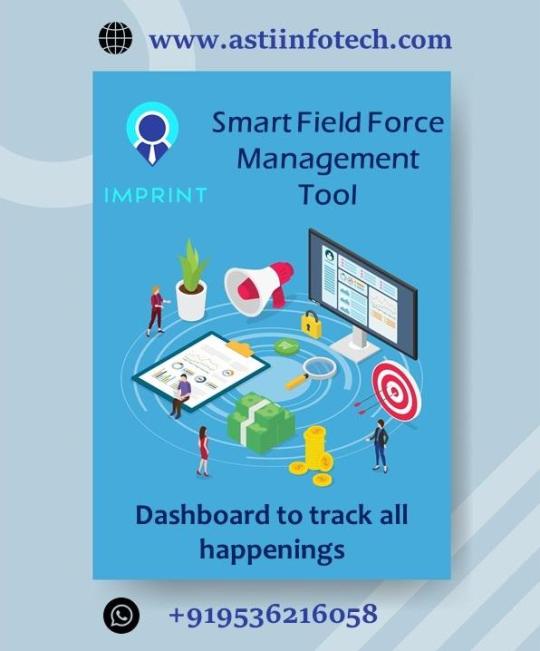
#leadsgeneration#leadmanagement#lms#employees#hr#business#digitalmarketing#leads#salesteam#sales#salesmanagement#salesforce#workforcemanagement#workforcesolutions#fieldforcemanagement#crmsoftware#crmsolutions#automation
2 notes
·
View notes
Text
Best Sales Training Software - LMS for Sales Teams
In today's competitive business landscape, equipping your sales team with the right skills and knowledge is paramount to success. Sales training is not just a one-time event but an ongoing process that requires continuous learning and improvement. This is where Learning Management Systems (LMS) for sales training come into play. These software solutions offer a comprehensive platform to deliver, manage, and track sales training programs efficiently. In this guide, we'll delve into the world of LMS for sales training and explore some of the best options available in the market.

Understanding LMS for Sales Training
A Learning Management System (LMS) for sales training is a software application specifically designed to streamline the process of training sales professionals. It provides a centralized platform where companies can create, deliver, and manage training content for their sales teams. LMS platforms offer various features such as course authoring, content management, progress tracking, and reporting, making it easier for organizations to ensure that their sales reps are equipped with the skills and knowledge needed to excel in their roles.
Key Features to Look for in an LMS for Sales Training
When evaluating LMS options for sales training, it's essential to consider the following key features:
Intuitive Course Authoring Tools: Look for an LMS that offers easy-to-use course authoring tools, allowing you to create engaging and interactive training content without the need for advanced technical skills.
Content Library: A comprehensive content library with pre-built courses and modules can save time and resources. Ensure that the LMS you choose offers a variety of training materials tailored to sales professionals.
Mobile Compatibility: In today's mobile-driven world, sales reps need access to training materials anytime, anywhere. Choose an LMS that is mobile-compatible, enabling learners to access content on their smartphones or tablets.
Assessment and Quizzing: Assessing the effectiveness of sales training is crucial. Look for an LMS that allows you to create quizzes, assessments, and surveys to gauge the understanding and retention of training materials.
Progress Tracking and Reporting: The ability to track learners' progress and generate detailed reports is essential for monitoring the effectiveness of sales training initiatives. Make sure the LMS provides robust reporting capabilities.
Integration with CRM Systems: Integration with Customer Relationship Management (CRM) systems such as Salesforce can streamline the training process by syncing training data with sales performance metrics.
Gamification: Gamified elements such as badges, leaderboards, and rewards can enhance learner engagement and motivation. Consider an LMS that incorporates gamification features to make training more enjoyable and effective.
Top LMS for Sales Training
Now let's take a closer look at some of the best LMS options for sales training:
Salesforce Learning: Salesforce Learning is an LMS built directly into the Salesforce CRM platform, making it seamless for sales teams to access training materials. It offers robust course creation tools, personalized learning paths, and integration with Salesforce CRM data for tracking sales performance.
MindTickle: MindTickle is a comprehensive sales readiness platform that includes LMS capabilities. It offers interactive content authoring, role-playing simulations, and analytics to assess sales rep proficiency and readiness.
Lessonly: Lessonly is an intuitive LMS designed for sales and customer service teams. It offers a user-friendly interface, customizable learning paths, and real-time feedback features to enhance learning outcomes.
Brainshark: Brainshark is a sales enablement platform that includes LMS functionality. It offers on-demand training modules, video coaching, and content analytics to help sales reps improve their skills and performance.
SAP Litmos: SAP Litmos is a cloud-based LMS with a focus on user experience and scalability. It offers a wide range of training content, mobile compatibility, and advanced reporting features to support sales training initiatives of any size.
Sandler Online: Sandler Online is an LMS specifically designed for sales professionals based on the renowned Sandler Selling System. It offers a library of sales training courses, reinforcement tools, and coaching resources to help sales reps master the art of selling.
Showpad Coach: Showpad Coach is a sales coaching and training platform that includes LMS capabilities. It offers video-based coaching, skill assessments, and performance analytics to help sales reps continuously improve their selling skills.
Conclusion
Investing in the right LMS for sales training is crucial for empowering your sales team with the knowledge and skills they need to succeed in today's competitive marketplace. By choosing a learning management Platform that offers intuitive course authoring tools, a comprehensive content library, mobile compatibility, and robust reporting features, you can ensure that your sales reps are equipped to drive business growth and achieve their targets effectively. Consider the options outlined in this guide and select the LMS that best fits your organization's needs and objectives. With the right training software in place, your sales team can elevate their performance and deliver exceptional results.
1 note
·
View note